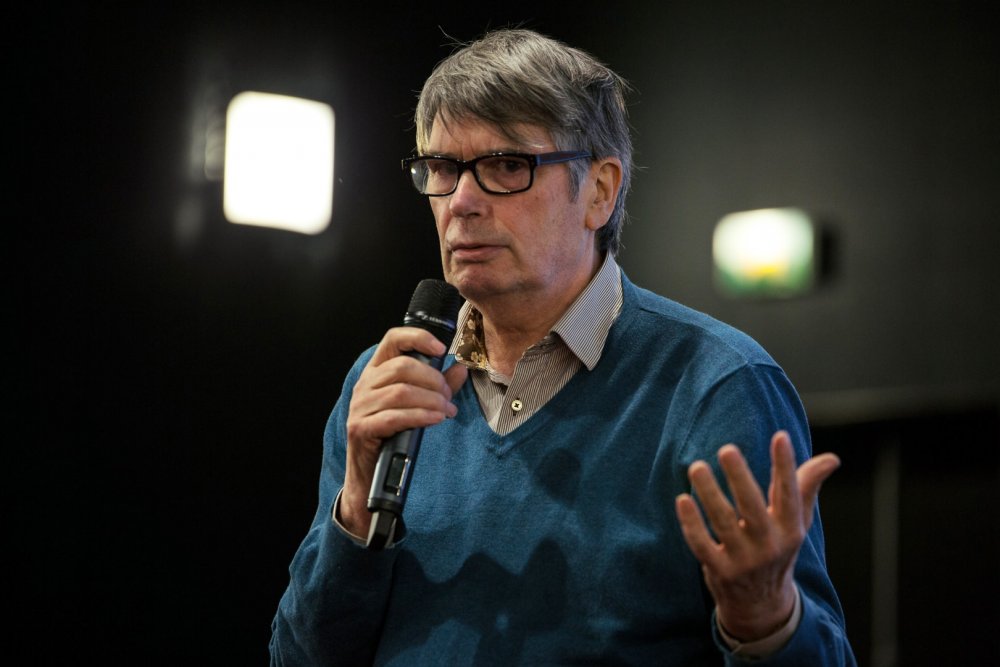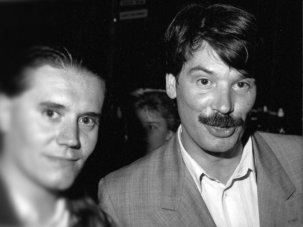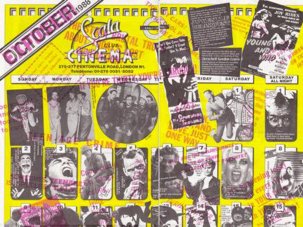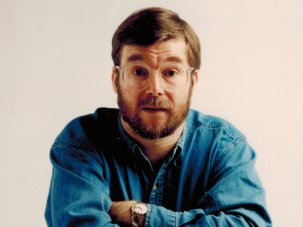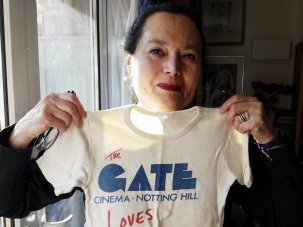Jane Giles, ex-programmer of the Scala Cinema:
“He was part of this ever-changing landscape and it seems incredible that he’s suddenly gone”
In 1981, company directors Stephen Woolley and Nikolas Mark Powell of Sunbeam Productions Ltd, AKA the Scala, signed a 12-year lease on the old Kings Cross Cinema.
With his scary Viva Zapata moustache, loud sweary shouting and financial intolerances, Nik was Sunbeam’s Bad Cop. We were terrified of him. “You tell Nik we can’t pay the rent because you programmed Dumbo instead of Salò and only 44 people came all day,” said Scala general manager Alex Fenner. “No, you tell him that you spent a month’s rent on a Harley Street vet because someone put amphetamines in the cat’s food,” I replied.
Nik was always grumbling about the Scala, “that bloody cinema” as he called it. “We’re into software not hardware,” he said, and by the late 1980s the Scala’s parent company Palace Pictures also had a computer games division in the cinema office once occupied by their nascent video company.
The Nik stories became legend. Childhood friends with Richard Branson. The Coutts bank account. Nik’s 1982 split from the company he co-founded, Virgin Records. Mega Video, which was quickly renamed Palace Video and soon to branch into film distribution and production with his business partner, film programmer Woolley. Nik’s incandescent bad temper. That extraordinary laugh! The ever-present mobile phone. His epilepsy. His optimism and determination. Sandie Shaw.
No one talked about his sensitivity, but that day in 1992 when the over-diversified Palace went under, Nik wept in front of his company. “To admit failure and to admit that I had let them down… to admit that I had not succeeded when for a year I had been telling the staff that we would survive, was terrible,” he said.
When Angus Finney’s book The Egos Have Landed: the Rise and Fall of Palace Pictures was published in 1996, the author invited Nik to a Q&A at the National Film Theatre. Nik was 45-minutes late and would barely look at Finney. It was painful. It would always be painful. This upstart company had changed film culture in the UK, and it still felt like everyone hated them.
In the years after Palace folded and the Scala’s lease ran out I’d often see Nik around the film industry, usually with his credit card behind the bar. And guess what? He wasn’t scary at all. He was kind and generous. From students to top executives, Nik knew everyone and everyone knew him. He was part of this ever-changing landscape and it seems incredible that he’s suddenly gone.
Last year I interviewed Nik for my book about the Scala. He recognised that “that bloody cinema” had provided an unofficial film education for an entire generation of film students and writers. He then misremembered the story of its 20-year-old film programmer (now Hollywood producer) Joanne Sellar discovering a dead body in the cinema after a screening of Looking for Mr Goodbar. Finally, and with someone else waiting to talk to him, Nik picked up the Benugo’s tab and wrote me a cheque to help subsidise the cost of producing the book, to make it affordable for students.
Nik’s legacy includes 61 IMDB credits as executive producer, from Angela Carter adaptation The Company of Wolves (Neil Jordan, 1984) to the Macedonian film Willow (Milcho Manchevski, 2019). What’s impossible to quantify is the combined audiences for his films, and those of the students who became filmmakers thanks to Nik’s co-direction of the Scala and direction of the National Film and Television School, which, to the surprise of the industry, he took over in 2003 and transformed.
- Jane Giles is author of Scala Cinema 1978-1993 (FAB Press), the winner of the 2019 Kraszna-Krausz award for excellence in film book publishing
Amanda Nevill, CEO of the BFI:
“A legend to us all”
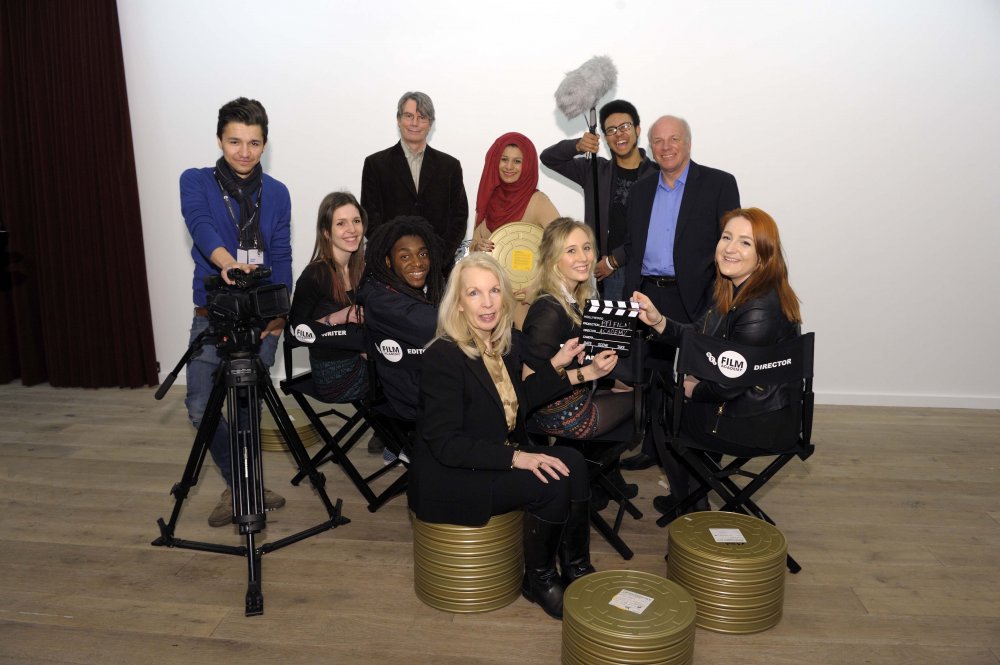
Nik Powell (back) and Amanda Nevill (front) with the graduates of the 2013 BFI Film Academy course
Nik was a one-off, injecting a sort of rock n roll teenage exuberance to everything, his energy sweeping us all along with him. His legacy is multiple, but his transformation of the NFTS, achieved with his extraordinary and driven clarity of purpose will always be found at the heart of film, now and in the future. He is a bit of a legend to us all.
Josh Berger, Chair of the BFI:
“A champion of British film and British filmmakers”
Over the years, I had the privilege of seeing Nik’s passion, energy and support for new talent, through Warner Bros’ partnership with the NFTS and also at the BFI. He was a champion of both British film and British filmmakers who made a mark on countless young people’s lives and careers. He will be sorely missed, but his legacy will live on through the films, television and games he helped so many people create.
Sandra Hebron, Head of Screen Arts at the National Film and Television School:
“Nik had limitless enthusiasm”
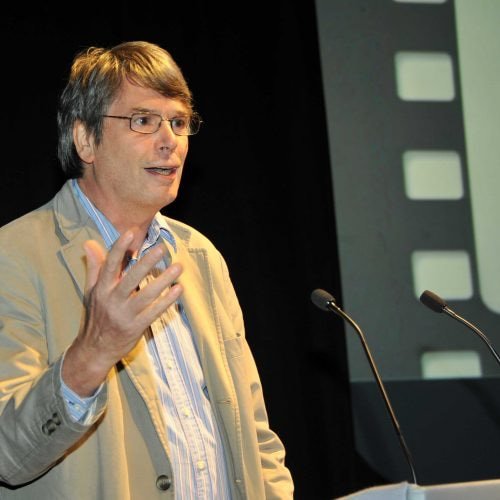
Nik Powell
I knew of Nik long before I met him, he was such a boisterous presence. In the 1980s and 90s the films he’d produced were essential viewing. Then, when I worked at the London Film Festival, I enjoyed screening more of them (and annoyed him deeply by turning down others); but I didn’t get to know Nik until I joined the NFTS.
He offered me a job in his customary style, telling me it was “a Nik Powell production” so I wouldn’t be paid much, that 25 days holiday a year was far too many, and I should plan on being at the school every working day. That was Nik in essence: no half measures, and he practised what he preached. He was present, in every sense. He loved the school and its students, and delighted in their successes. He took time every year to meet each new starter – even if for some that was a daunting prospect. But Nik wasn’t interested in intimidating them, he was disarmingly curious to know them better. An audience with Nik was a NFTS rite of passage, as was experiencing one of his idiosyncratic PowerPoint presentations, complete with dubious jokes, shoehorned-in Arsenal references and the exhortation to not be “an arsehole”. Unorthodox, but effective.
When Nik joined the NFTS it was an ‘at risk’ institution – so maybe it was a fight-fire-with-fire situation. At his leaving drinks Nik told us that he thought the role would be a way of keeping himself out of trouble – and his partner, Sarah, agreed.
But whatever the strategy, it worked big time. By then Nik had already advised and mentored many people in the industry, and the roles of educator and champion of the NFTS were a good fit, allowing him to combine ebullient entrepreneurship with his passion for spotting and nurturing talent. He reinvigorated the film and TV (and, later, games) industries’ involvement with the school, and oversaw major capital projects that significantly upgraded our facilities. His ability to part people from their money was formidable, as I discovered during a brief conference call in which an industry veteran who had approached us for help with a project found themselves instead being skilfully relieved of £10,000 for student bursaries. It was like witnessing someone have their pocket seamlessly, charmingly picked.
Nik had limitless enthusiasm for the things he cared about, and was generous with his time. He was convivial, a great raconteur and, of course, often very funny. He could also be pig-headed, unreasonable and infuriating. What I appreciated most of all was his kindness. Walking up to school one morning, I saw Nik in deep conversation with a student who was laden down with equipment. Nik leaned over and took one of the bulky bags, shouldering it himself. Nothing was said, he just instinctively lightened the load, as a good producer – a good person – would.
Nik was tireless in convincing industry greats to be involved in the life of the school. One of my fondest memories is from a few years ago, when after much persistence (another Nik trait), he persuaded Werner Herzog to visit and tutor NFTS students. The Saturday prior, Nik and I had lunch with Werner, who was to be treated to an afternoon at the Emirates watching Nik’s beloved team. As our meal drew to a close, Nik handed Werner an Arsenal scarf, and we boarded the tube to Highbury. I wondered whether anyone in the carriage spotted this pair of important, influential film mavericks, or just saw two Gooners of a certain age? I think Nik would have been happy either way.
-
The 100 Greatest Films of All Time 2012

In our biggest ever film critics’ poll, the list of best movies ever made has a new top film, ending the 50-year reign of Citizen Kane.
Wednesday 1 August 2012
-
The Digital Edition and Archive quick link
Log in here to your digital edition and archive subscription, take a look at the packages on offer and buy a subscription.




